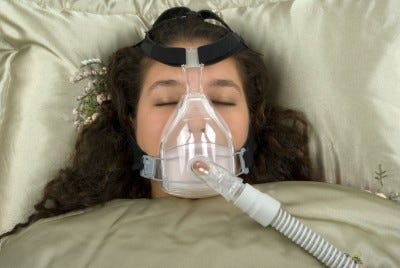CPAP cures metabolic syndrome in obstructive sleep apnea (Retracted)

CPAP Improves Metabolic Syndrome in Obstructive Sleep Apnea
This paper has been RETRACTED!
Continuous positive airway pressure (CPAP) therapy reversed elements of the high cardiovascular risk profile known as metabolic syndrome in a substantial minority of Indians with treatment-naive obstructive sleep apnea, according to this article in the New England Journal of Medicine. More than 75% of people with obstructive sleep apnea also have the metabolic syndrome (a cluster of cardiovascular risk factors including truncal obesity, hypertension, insulin resistance, and dyslipidemia). People with metabolic syndrome are at elevated risk for cardiovascular events; so are people with severe obstructive sleep apnea, although the precise mechanism has never been elucidated. Continuous positive airway pressure (CPAP) has been shown to minimally reduce blood pressure in people with OSA, but its effects on other metabolic parameters in small studies have been mixed. Surendra Sharma, Swastik Agrawal, Atin Kumar et al recruited 86 patients with moderate or severe obstructive sleep apnea in New Delhi, India; 75 of 86 (87%) had metabolic syndrome. Investigators randomized them to receive either CPAP or sham CPAP for 3 months, then to "washout" for one month before crossing-over to the other therapy for 3 months. RESULTS:
CPAP reversed the metabolic syndrome in 13% of people undergoing CPAP, compared to 1% in those receiving sham CPAP.
CPAP improved systolic and diastolic blood pressure by 3 mm Hg; glycated hemoglobin by 0.2; triglycerides by 18 mg/dL; and LDL by 10 mg/dL.
Those who used CPAP at least 5 hours per night had even stronger improvements on each parameter (a 6 mm Hg improvement in systolic blood pressure and 15 mg/dL reduction in LDL, for example).
Why would CPAP improve cholesterol and insulin resistance? My theory is that people who are more awake move more throughout the day. Exercise has huge effects on insulin sensitivity, and can improve cholesterol too.

Clinical Takeaway: Three months of CPAP therapy had a positive impact on cardiovascular risk profile in most people with moderate or severe obstructive sleep apnea in India. Although it's striking and encouraging that marked metabolic improvements could occur in such a short period, it's also unclear whether these benefits persist over time, or whether they result in a reduced rate of cardiovascular events. Nevertheless, this adds to the body of strongly suggestive evidence that CPAP may prevent cardiovascular disease in severe (and possibly moderate) OSA; physicians should share this news with moderate/severe OSA patients, in order to encourage their adherence with CPAP.
This paper has been RETRACTED!
Sharma SK et al. CPAP for the Metabolic Syndrome in Patients with Obstructive Sleep Apnea. N Engl J Med 2011;365:2277-2286.


